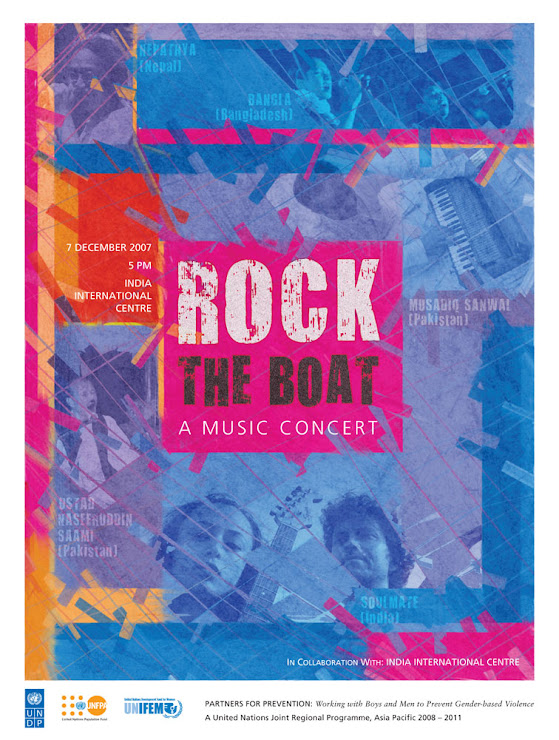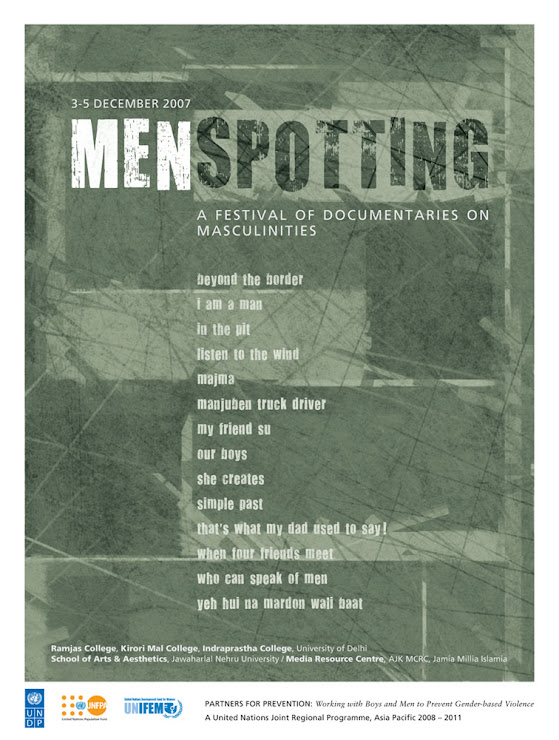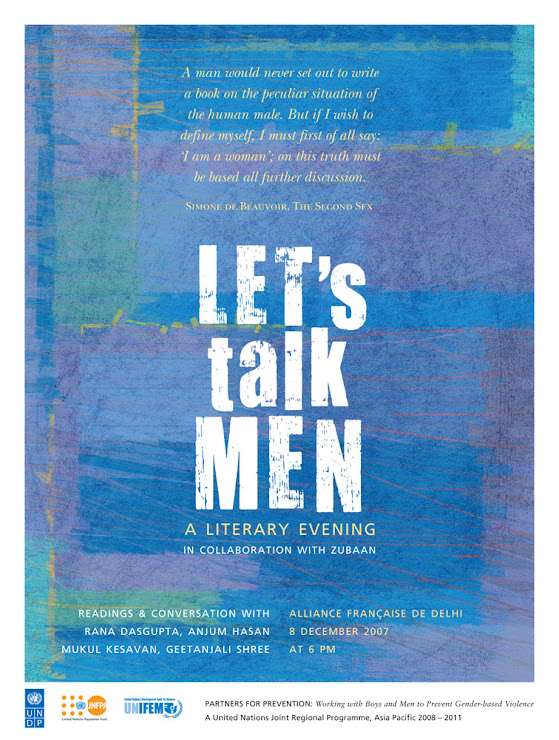

The same man sitting on the podium in the morning (scratching his beard abstractedly) was jumping up and down excitedly in the evening (hooting and whistling). Seeing these two very different faces of Rahul Roy made me realise the long and winding journey that the day had made as its axis shifted from the intellectual to the visceral, from a head stirring round table discussion to a foot tapping musical concert.
The roundtable discussion took place under the aegis of the UNDP/UNIFEM/UNFPA on What policies can inspire more men to end Gender based Violence? The panel included Ms. Winnie Byanyima, Director of Gender Team / Bureau of Development Policy, UNDP, New York, Mr. Dean Peacock, Co-Director, Sonke Gender Justice Network, Cape Town, South Africa, Ms.Socorro L. Reyes, Chief, Asia-Pacific and Arab States Section from UNIFEM HQ, Dr. Kalyani Menon Sen, Feminist activist, Researcher and Trainer, India, Mr. Alan Greig, Consultant on Gender, Violence and HIV/AIDS, USA, Dr. Abhijit Das, activist, and Mr. Rahul Roy, independent filmmaker. The meeting was a pretty important one as it was kicking off a region wide initiative in South Asia by the United Nations and partners. This joint programme hopes to consolidate the strengths of leading United Nations institutions into a singular endeavour to support violence prevention in the region and to help ensure boys and men are part of the process.
The panelists were an interesting mix of people who ranged from those who worked closely on the ground with men and women on gender issues, to film-makers and activists. The discussion was moderated by James Lang, Programme Advisor Gender, UNDP Asia Pacific Regional Centre, Colombo, Sri Lanka who had to tread the fine line between working with the regional governments and tapping the potential of the NGOS as well as those who were vocal opponents of the prevailing state power.
Ms. Winnie Byanyima spoke of her experiences of working with different grass root and policy making organisations in Africa. According to her gender biases were self-evidently prevalent to the extent that they were accepted and encouraged by those in authority. She felt that any decisions on policy must take these into account if they were to be effective.
Ms.Socorro L. Reyes, Chief, Asia-Pacific and Arab States Section from UNIFEM HQ stressed the point about how gender sensitisation must begin from home and then spread to other areas of policy making.
Dr. Abhijit Das contrasted the ease with which radical policies could be framed and legislated with the immense difficulties that arose once they were sought to be implemented, the Domestic Violence Bill being a case at hand. According to him the ground had to be well prepared before the seeds were sown. This means that a lot of grass root work must be already in place. He supported a region wide initiative on the ground that while the political regimes in South Asia were varied, their societal bases were very similar.
Mr. Dean Peacock shared some vignettes of his work at the grass root level in South Africa. He was quite appreciative of the work done by UN agencies to get tough fought campaigns through. He was appreciative of the fact that even the most radical legislation on policies may not work on the ground due to lack of resources and training.
Mr. Alan Greig gave the example of America to show that while domestic violence at the individual level may have diminished as a result of legislation, institutionalised gender/race/class based violence had simultaneously got depoliticised to the level that it had stopped being a part of the discourse. He emphasised the complexity of the issue and the necessity of male participation in the process of bringing about gender equality.
Dr. Kalyani Menon Sen stressed on the patriarchal, homophobic, and militaristic nature of the state. She spoke about how all gender equality issues and policies had to be pushed and defended against the current.
Mr. Rahul Roy was quite emphatic about the fact that a lot of gender related issues were either missed or misunderstood. For example, he felt that it was not meaningful to have a division between positive and negative masculinity. All masculinity in the patriarchal system was problematic. He also spoke about democracy in India having a political and a social side. While political democracy was vibrant, social democracy was weak and all policy on issues of gender equality would have to be fought in the social arena.
After a brief question answer session with the audience, the hall became hushed, curtains were drawn, and lights shut off. It was time to see two short films made by children. The first film explored the question of anger and what makes people angry. It was largely in the form of interviews and came up with some very interesting answers. The film was made by children in Delhi. The second film, this one by children in Karachi had them enacting the patriarchal behaviour of their elders in different situations. It raised the question of violence, gender relations and patriarchy as seen from the eyes of children.
The evening- and it was time for the singing caps, warm clothes and dancing shoes. It was time for the musical concert, Rock the Boat. I was frankly sceptical of putting on my boogie boots. This is because the atmosphere of the lawns of IIC, where the concert was held, is normally staid, even somewhat stodgy, but events proved otherwise.
Between the ferocious Friday traffic and getting my two kids ready for the show, I unfortunately missed the first performance. This was by Musadiq Sanwal, a musician and journalist from Pakistan. However I heard a CD of his songs later, at a friend’s place and found Musadiq’s voice to be extremely soulful and melodious. Since the early eighties he has been singing and composing songs of Punjabi and Saraiki Sufis, the poet-musicians of the valley of Indus. Mainly self taught his vocal style is that of a rural musician performing popular raags of Sindh and Punjab.
I met the singer later on during the concert and found him to be a nice, soft spoken gent who was coming to India after a gap of twenty one years. Clad in jeans, he looked much younger than the photograph in the brochure.
I was just in time to catch the concluding section of Ustad Naseeruddin Saami’s performance. He hails from the Qawwal bacha dilli family. Ustad was singing ‘Piya ke ghar’ with great gusto. Ustad Saami is a strict follower in the style of his family tradition-keeping 'Sur' as the most important component of his singing. His singing is peaceful and calm. Heartfelt rendition of the raga, manifesting the emotions, which are mentioned in the bandish, is one of the main aspects of Khayal Gayaki, in which he excels. He shows his versatility by also singing, Sadara, Thumri, Tarana, Dadra and Ghazal in the Khllm.
Then it was time for the bands to burn the night with their mix of blues, rock, folk and funk.
Soulmate from Shillong had the rocking Rudy and extremely trippy Tips belting out the blues. Then came Nepathya from Nepal, whose charismatic lead singer Amrit Gurung, whose mix of rock and folk in Nepalese had the crowd dancing and swaying to the swishing of his long ponytail. Finally Banga from Bangladesh with their fusion of Bengali folk (essentially Baul) and jazz-rock crowned the night with the mesmerising voice of their singer Anusheh Anadil. And all this, as Anusheh put it ‘for the cause of sensitising men towards their masculinity’, something she admitted she had not conceived would come to pass. But it did and the night and all the events of the earlier days and of the days to come are living proof of it.




No comments:
Post a Comment